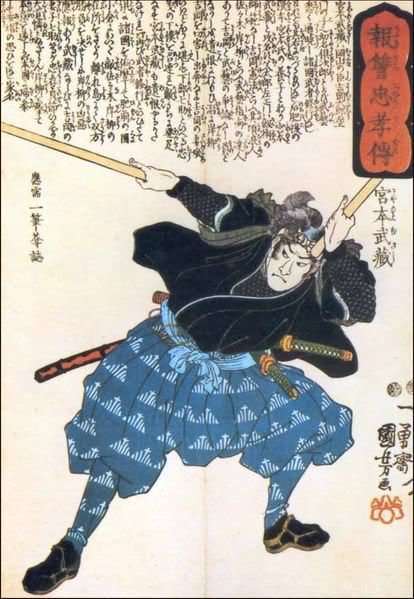
Book of Five Rings, Miyamoto Musashi
Interpreted by Stephen F. Kaufman, Hanshi 10th Dan.
Like the blues, Samurai texts often lose power and beauty in the hands of white people. The Book of Five Rings is Miyamoto Musashi’s treatise on battle strategy and warrior philosophy. Made quaint, antiquated and irrelevant by a martial arts culture completed detached from combat, it moldered on my shelf for years, offering little to my understanding of fight training. Or so I thought.
At the beginning of this project I pulled the book off the shelf to see if I could cull anything useful from it: fighting, like anything else, is primarily a mental exercise. As I reached the end of the book I realized that Musashi does not belong to so-called traditional martial artists. When Musashi writes that, “Through constant application of your training skills, you will come to understand the value of a particular technique if you practice with full resolve and use the methods of visualization in your training,” he is talking to the full-contact-training modern mixed martial artist.
Even though Musashi wrote about sword play, much of his philosophy
applies directly to modern combat sports. The grandmaster didn't believe he had attained supreme knowlege, and he wrote, “If you constantly disregard the possibilities of other methods and tools then you become short-sighted and may in fact lose the advantage of your own strength.” Constant growth and the quest for perfection is the "spirit of the thing itself."
Two subjects in particular carry significance for street defense and MMA competition; focus and intent. Without proper focus a fighter loses precious moments in which to strike and makes himself vulnerable to attack. Without proper intent, his attack will be weak and fail.
Mental focus begins with the eyes, but Musashi isn't talking about having a 20/20 vision. When fighting, "I look through him and only think of making the hit. I have no preconceived notions of which target is the one to aim for." Watch a fighters eyes - are the fixated on his or her opponents face, hands or feet? Do they wander around? By training our eyes at a point where the throat meets the breastplate and looking "through" rather than focusing on that point, we see the entire fight unfold without having, as Musashi said, "preconceived notions of which target is the one to aim for." When you stop looking you start seeing.
Musashi refers to timid fighters as Bashful Monkeys. The Bashful Monkey is afraid of being hurt and keeps himself more than an arms length from his opponent because he is unsure of his abilities. Fighting with the attitude of "no mind" is a major theme in the Book of Five Rings. A fighter is most vulnerable to attack while striking. But if that fighter holds back, or is timid and fearful of being hit, not only will their attack be weak and ineffective, they will likely suffer a damaging counter attack.
Musashi wrote over and over that a warrior has but one concern and that is the destruction of the enemy. Any fear of injury or distraction increases the likelihood of defeat. "When it is necessary to attack," he wrote, "(warriors) do so with complete resolve, sure of themselves, neither overbearing in attitude or with false humility. They simply attack with all their heart and soul.”
Maintaining focus and timidity when attacking are two things I struggle with in my training but now I have a few more mental weapons to attack my deficiencies with. Musashi is only one of many Eastern philosophers whose work has been bastardized and watered down to sell at motivational or self-help seminars, but he belongs to the fighters of every era. I am taking him back. 
Tuesday, August 21, 2007
The Book of Five Rings, Miyamoto Musashi
at
7:00 AM
![]()
Subscribe to:
Post Comments (Atom)


2 comments:
Ghost Dog: The Way of the Samurai.
Hahaha. When I review the Hagakure I am def. including a F. Whittaker picture.
Post a Comment